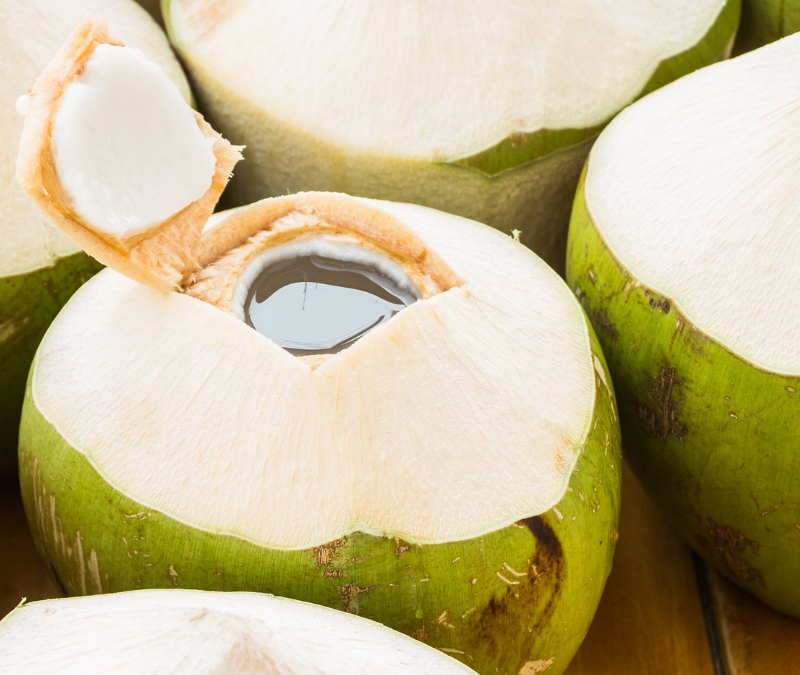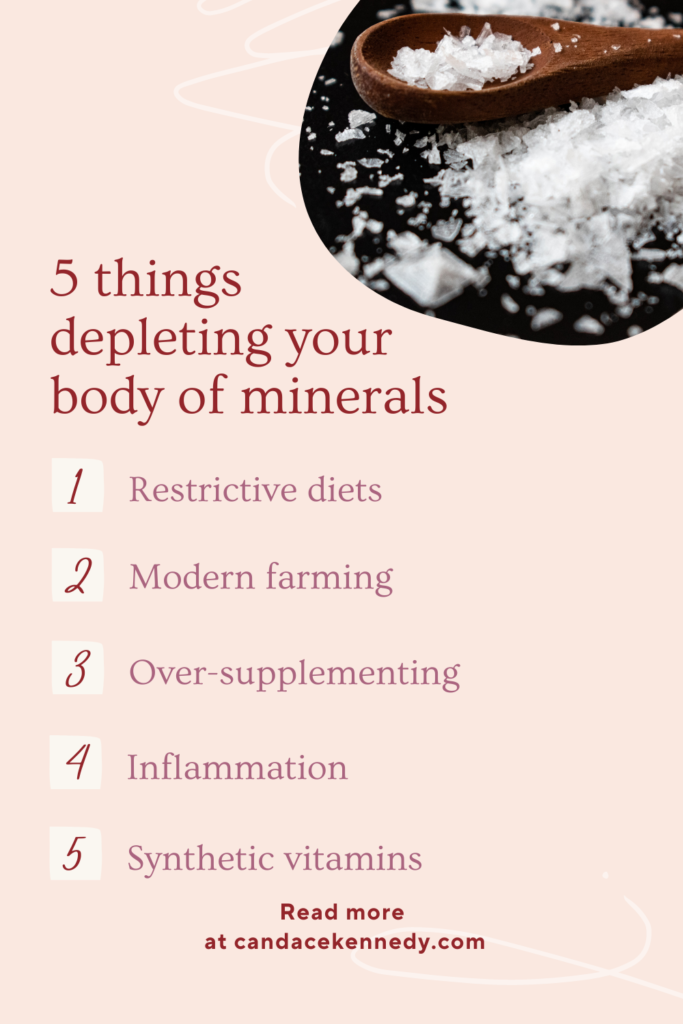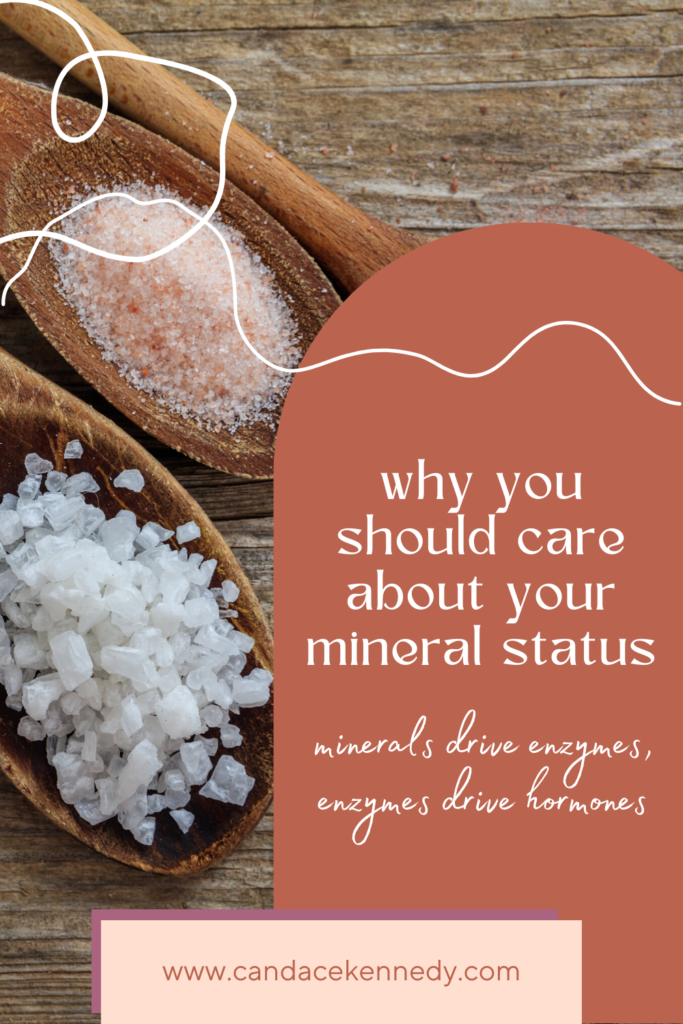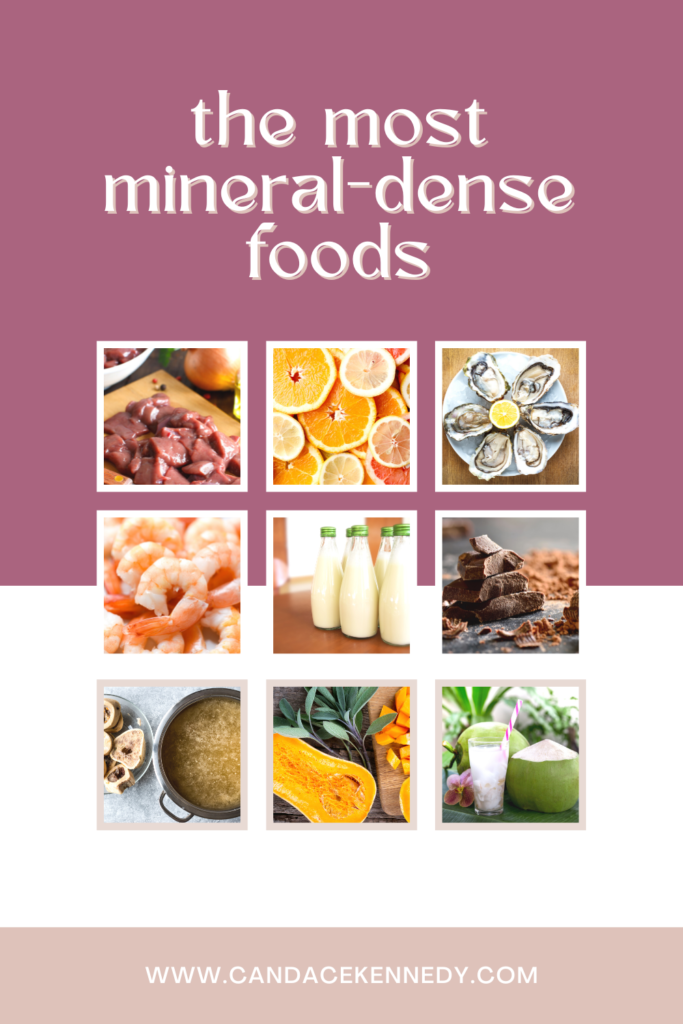Minerals matter. They REALLY matter.
Minerals run enzymes. Enzymes run hormones. Hormones determine how you perceive and interact with the world. A lack of minerals leads to hormone imbalances and many other health issues. Every cell in your body uses minerals to make energy, make and signal hormones, and make enzymes.
If you’re thinking, okay, right so can’t we just eat food like we always have and get minerals? Why are they so important now? Great question! The main reason is we are exposed to more mineral “depleters” than ever and are getting fewer minerals in our diet than before.
Why we need more minerals than ever
It’s true, humans didn’t use to have to be so obsessed about getting enough minerals. But a lot has changed in the way we live and the way we grow our food over the last 100+ years.
- Modern farming has led to a severe decline in the mineral content of our food
- Water from the tap is not what it used to be. Although potable, minerals from the tap are imbalanced and primarily consisting of hard inorganic minerals like calcium carbonate
- Bioavailable minerals used to be much more abundant in our tap water
- Tap water also contains compounds like fluoride that bind to minerals and keep us from using them
- Not only that, but we are more chronically stressed than ever. Stress leads us to burn through minerals more quickly
- Water filtration is great and highly encouraged here, but it also removes crucial minerals from the water
- We are more mineral-depleted than ever
What depletes minerals?
Stress, for starters. When you’re stressed, the body burns through minerals fast, especially magnesium and sodium. Inflammation is also a mineral depleter and many of us are more inflammed by things like consuming high amounts of industrial seed oils. Pesticide use, especially glyphosate also binds to minerals and keeps our bodies from using them. Our soils are depleted due to modern farming practices. Depleted soils mean depleted animals and plants that humans eat. If our food is depleted in minerals, that means depleted humans.
Dieting is also a huge factor leading to mineral imbalances. Restrictive diets are stressors on the body and often do not provide our bodies with the nutrients needed for optimal health. Vegans and vegetarians, for example, are not getting the most bioavailable nutrients from traditional foods like organ meats and raw dairy so they are not able to absorb as many nutrients. On the other end of the spectrum, the carnivore diet is limited in some minerals like potassium. And the keto/low-carb diet leads to mineral loss, especially electrolytes.
Some supplements and synthetic vitamins can cause mineral imbalances and depletion, including things like ascorbic acid and vitamin D.
Supplemental Vitamin D depletes leads to mineral imbalances
Supplementing with Vitamin (hormone) D can decrease magnesium and potassium. Because your body needs retinol to activate Vit D receptors, high amounts of D decrease liver retinol. We need retinol to keep copper bound to ceruloplasmin. When it’s not bound, it’s toxic. This sets the body up for oxidative stress and metabolic destruction.
Supplemental Vitamin D also lowers ceruloplasmin and increases calcium buildup, which as we saw above, it a big issue!. Supplemental D can also create “anemia”-like symptoms by increasing H2O2 and hindering our ability to break it down. When iron interacts with H202 it creates a dangerous chemical, OH. Our body will do all it can to prevent H202 from interacting with iron, so it moves iron from the blood and hides it in tissues, so blood work will look like “anemia,” when iron is just hiding.
When minerals are out of balance, the body is out of balance
Mineral imbalances are at the root of chronic illness, stubborn weight gain, and a whole host of unpleasant symptoms, including gut issues. Your body needs a specific set of materials to carry out its functions and minerals are at the foundation of it all.
A few examples:
- Hormone imbalances? Magnesium is needed to support the liver in breaking down estrogens.
- Poor digestion? We need zinc to make stomach acid to properly break down food.
- Achy joints? A low-boron intake is associated with arthritis and joint pain
- Hypothyroid? Copper is needed to convert T4 to T3. Selenium and iodine are both needed to make thyroid hormone.
- Insulin resistance? You need potassium to get glucose into the cell. If you don’t have enough potassium, blood sugar levels can remain at unhealthy levels.
Hydration and minerals
Our bodies need minerals to drive hydration into our cells. Without minerals, our cells cannot be properly hydrated. Our water used to be rich in minerals, but now it is depleted or contains compounds that bind to minerals and keep your body from accessing them. Without adequate amounts of these minerals, it’s very difficult to be properly hydrated.
Sports drinks like Gatorade and Pedialyte are full of synthetic dyes, fluoride, and other chemicals. Drinking these sports drinks is very counter-productive when it comes to hydration because in order to mitigate the myriad of health issues that stem from such synthetic beverages, you need minerals. So you burn through more minerals just to process these sports drinks.
And while we’re at it, whoever came up with the idea to drink a gallon of water? Drinking excessive amounts of plain water (water that doesn’t have minerals added back to it) will just deplete your body of minerals. No bueno.
Better to get REAL hydration from mineral-rich foods and beverages.
Get minerals from food, not supplements
No mineral works in isolation. They require other minerals and co-factors to carry out its job. That’s why getting minerals from mineral-rich foods is so important. Mineral supplements won’t have all the needed co-factors to put each mineral to work effectively. But food does.
What are the best sources of minerals?
If you scroll through a lot of my posts, you’ll start seeing a recurring theme of some of the same foods highlighted over and over again. There’s a reason for this.
These are all mineral-rich, easy-to-digest, bioavailable foods that our bodies thrive on.
Some of these foods include:
- Beef Liver/organ meats (if you’re new to organ meats, beef liver capsules can be an easy intro)
- Oysters/shellfish (great in this smoked oyster paté)
- In-season fruit
- Raw dairy
- Dark chocolate/cacao
- Squashes
- Grass-fed meat
- Bone broth
Other ways to get minerals:
- Adding mineral drops to water can make a huge difference when it comes to hydration.
- Epsom salt baths
- Daily adrenal cocktail (at least 1 per day, sometimes 2 or 3, depending on stress levels)
Some of the best ways to stay hydrated:
- Filtered water with sea salt or mineral drops
- Coconut water
- Bone broth (I like this brand or make your own)
- Herbal tea
My go-to brands for minerals drops are:
- Concentrace
- Aussie drops
- Aquatru
- You can also just toss in a pinch of high-quality sea salt too.
Interested in learning more about how minerals are being used by your body? Ask me about an HTMA.
Did you learn something in today’s post? Let me know! What are your favorite ways to stay hydrated?



